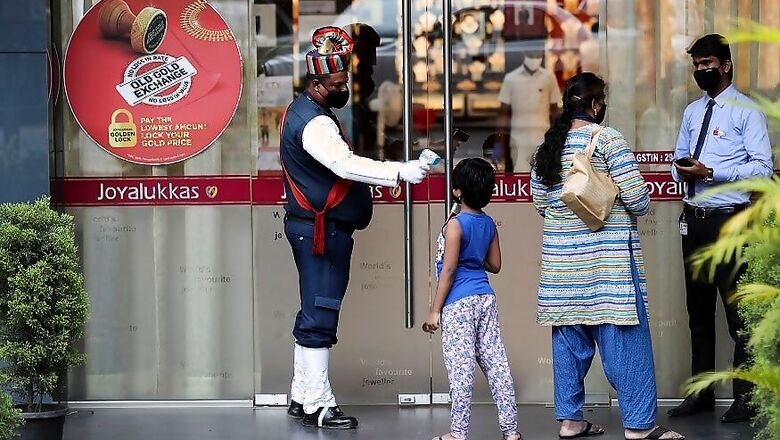
views
Not Chennai, not Mumbai, not Delhi. Bengaluru is the Indian metro with the fastest doubling rate now, going by the latest data from the Bruhat Bengaluru Mahanagara Palike (BBMP).
Of course, the overall Covid-19 numbers may be low, but cases are doubling every four days now.
Compare that with other metros: Chennai cases double every 18 days, while Delhi's every 15 days. Mumbai cases are currently doubling every 41 days. IT city Bengaluru, which boasted of less than 400 cases until May 31, is now seeing more than 4,600 active cases, and the cases are doubling every four days.
Saturday's data showed 1,913 active cases in Bengaluru, while Wednesday's data showed 4,649 cases that are currently active — a jump of more than 100 per cent (or double).
There is a sea change from the way things stood on May 31 and how they stand on June 30 on another parameter — the source of infection.
On May 31, barely 17 per cent of the Covid-19 cases in Bengaluru had no known source. All the others, 83 per cent of the cases, were traceable to either travel or to contact history with affected patients.
Today, 90 per cent of the cases have no known history or source. They are either random influenza-like-illness (ILI) cases that have cropped up and have later tested positive for Covid-19, or cases of severe acute respiratory infection that have later tested positive for Covid-19. Less than 10 per cent of the cases are ones with travel history or contacts of patients.
So what has led to this mess? How did the cookie crumble?
Experts say while Bengaluru, a city with a population of 1.3 crore people, is still among the best-performing metros when it comes to absolute numbers, that's no reason to get smug.
"If you look at number of cases, we must compare with our own previous week rather than with other cities," says eminent cardiologist Dr CN Manjunath, one of the advisors to the government. "And when you compare with our previous week, it is a matter of concern. The number of cases may be small compared with other cities, but there is definitely a sudden jump."
And now is the time to strengthen contact tracing, he says. "We have to be aggressive on contact tracing, and we need to put in more manpower also for this. Testing and contact tracing are key, and they must go hand in hand," Dr Manjunath told News18.
One plausible reason for the sudden spurt could be wilful violation of home quarantine norms. As on June 29, there were 17,000 violations of home quarantine. And this is just the tally of violators who were identified, and later acted against — either by a warning or by booking cases against them. There may be many more, of course, whose violations have gone unnoticed, who may have been silent carriers of the virus.
"The cause of the spread is because a lot of people came from other states, particularly Maharashtra. And all big working places, offices, government departments, police stations, etc, have resumed full operations, and if one person is infected then multiple contacts of his/ hers are infected directly or indirectly," Dr Manjunath points out.
This is why it is all the more important that all symptomatic patients must be tested now, and their contacts isolated, while there must be random sampling of high-risk exposures — for example, random sampling of people in slums, in supermarkets, wet markets, etc. Both these tasks have now been taken up by the government.
Epidemiologist Dr Giridhar Babu says Bengaluru has outperformed other metros on every parameter — in absolute number of cases, in fatalities, in large-scale testing, and most importantly, in the R0 (R-nought) factor. This factor, that indicates how many people are infected by each Covid-positive person, is also low in Bengaluru, compared with many other cities. This, in fact, is the main indicator of an epidemic spread.
He feels that the way the data has been interpreted may be flawed.
"I don't think the doubling rate is four days. For Bengaluru, it is about 15 days. What has happened in the last few weeks is, there had been many pending cases of clearance (backlog in testing). And then suddenly, all these numbers are getting announced at once. That doesn't mean cases are increasing the same way each day," Dr Babu told News18.
But the surge in cases by 500 to 600 per day for the last week remains a matter of concern. Some experts have even advised the government to increase restrictions in inter-district movement or go in for a partial lockdown, to rein in the numbers. As of now, the government has imposed a night curfew from 8 pm to 5 am, and a curfew on Sundays for the next one month, to restrict socialising.
"We would need more beds, we need to plan for this surge. During the lockdown, no city has done as well as Bengaluru did on containment. The cases that have come now are imported — whether from out of state or out of country. Now we need to prevent local transmission," Dr Babu told News18.
Once lockdown is lifted, it is natural that people will start moving around freely. So all the more reason that the contact-tracing mechanism has to improve. But it has been weakened of late, and that is worrying, he said.
Not all labs are testing at full capacity either — another aspect the government must work on, to rope in private labs more efficiently in getting quicker results.




















Comments
0 comment